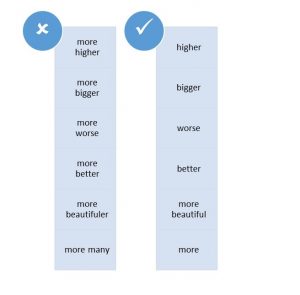English is not an easy language to learn or master, especially for non-native speakers. Sometimes, we get so used to saying things in a certain way that we don’t stop to wonder if it’s correct.
So, it is only expected that we will see mistakes (some of which are hilarious) from different parts of the world. Visit this Facebook page to be entertained.
Here are some common errors that I have seen or heard:
1. Let there be light!

(Image Credit: rg1024)
(License: Creative Commons Zero 1.0 Public Domain License )
It is very common in this part of the world to convert the adverbs ‘on’ and ‘off’ into the verb itself. For example, we hear this a lot in this part of the world (Malaysia) :
× Please off the lights when you leave the room.
Folks, there’s a missing verb there. Use the word ‘turn’ or ‘switch’:
√ Please turn off the lights when you leave the room.
√ Please switch on the air-conditioning if you feel warm.
2. Regardless vs Irregardless
The correct word is ‘Regardless‘.
√ Regardless of the outcome of the study, I will go ahead with my plans.
There’s no such word as ‘irregardless‘, although it is commonly used in informal speech nowadays. It is not considered correct in standard English.
√ Regardless of what anyone tells you, do not use the word ‘irregardless’.
3. Rise up and raise a ruckus.
‘Rise‘ is intransitive i.e. there is no object tied to it. Something rises — from a sitting, lying or kneeling position. It can be used to describe the action of getting up from bed or elevating to a higher level.
√ Early to bed and early to rise makes a man healthy, wealthy and wise.
√ Prices of essentials normally rise before the holiday season.
√ My cake didn’t rise because I made a mistake when measuring the ingredients.
‘Raise‘ describes the action of moving something to a higher position. Something raises something.

(Image Credit: Dean Moriarty)
(License: CC0)
√ Please raise your hands to volunteer for the charity run.
√ That company has raised prices for five consecutive years.”
√ Every morning, the soldier rises early to raise the flag.
(Note: Sometimes, we hear people say ‘Please raise up your hands.’” The word ‘up‘ is not needed in this case.)
4. I advise you to practise this.
In British English (BrE), the noun normally ends with an –ice which the verb ends with –ise .
Many confuse ‘advise’ and ‘advice’ when writing. Here’s the correct way to use the words:
√ Verb: I advise you to pay attention to the Minister’s speech.
√ Noun: Please give me some advice as to how I can format this report.
Here’s an easy way to remember it:
I advise you to be wise.
That’s some nice advice.
In American English, the words advise and advice are used the same way. However, there is difference when it comes to ‘practise’ or ‘practice’.
Following the rule mentioned before, in BrE, ‘practise‘ is a verb while ‘practice‘ is a noun.
√ Verb: I need to practise for my competition next week.
√ Verb: Practise your scales to improve your piano skills.
√ Noun: Public Speaking is a skill that requires training and practice.
√ Noun: I need to attend football practice today.
But in AmE, ‘practice’ is also used as a verb. When reading materials from the USA, it would be normal to see a sentence like this: Please practice your yoga poses today.
Much of the confusion is caused by the auto-correct feature in word processing software which may be using different dictionaries. When writing, remember who your intended audience is and which side of the Atlantic they are from.
In summary:
In BrE: ‘ practise ‘ is a verb; ‘ practice ‘ is a noun.
In AmE: ‘ practice ‘ is both verb and noun.
5. May I borrow your pen to lend to Sally?
I see many are confused between borrow and lend.
Borrow means you are taking something with the intention to return. Lend means to grant the use of something, on condition it is returned.

(Image Credit: Peter Stanic)
(License: CC0)
√ Ann: May I borrow 10 dollars from you?
√ Julie: Sure, I can lend you the money. When can you return it?
In short: You borrow from; You lend to.
6. Lie, Lay, Laid, and Lied
Let’s start with Lie vs Lay.
Lie means to recline. Lay means to put something down in a flat position.
√ I felt weak and had to lie down for a few minutes.
√ I lay the books down on my table.
(There are many other ways in which lay and lie are used. This article deals with a particular context.)
The confusion is mostly caused when we talk about the past.
The past tense of lie is lay:
√ I lay down in bed yesterday because I was feeling weak.
The past tense of lay is laid:
√ When we visit the bazaar, the textile merchant laid out his wares for us to view.
Now, to add to the confusion, lie also means to speak an untruth (verb) when used as a verb.
√ Please don’t lie to me about your test scores.
The past tense of the verb, lie, is lied:
√ You lied to me last week when you said you would return the loan in a couple of days. It’s been 8 days since you borrowed from me.
Here’s a table that will help you remember this.
|
Present tense |
Past Tense |
|
Lie (recline) |
Lay |
|
Lay |
Laid |
| Lie (untruth) |
Lied |
7. You can go farther to learn further.
Farther is used for physical distance.
√ From Kuala Lumpur, New Delhi is farther than Bangkok.
√ I have to drive farther to work after I moved to my new home.
Further is used when speaking figuratively or metaphorically.
√ Your idea is interesting. We can discuss it further later today.
√ Without further delay, we must upgrade our anti-virus software.
8. A leap of faith and a jump for joy
You jump up or down. You leap over, forward or backwards.

(Image Credit: Danny Schreiner)
(License: CC0)
This is a jump.

(Image Credit: Sasin Tipchai)
(License: CC0)
This is a leap.
Quoting from ‘50 Unusual Facts About Tigers‘ in listverse.com:
Tigers can leap distances of over 6m, and jump up to 5m vertically.
9. I am sure you are not as boring as you say you are.
If only I got a ringgit each time I hear someone say “I am boring.”, I would be a millionaire.
I don’t know why this is so common in Malaysia. I wonder if the mistake is actually a joke. Maybe for some. The speaker uses it (wrongly) to describe that he/she is in a state of boredom. The correct way to say this is “I am bored.”
√ I am bored because I cannot find anything interesting to do today.
When a people say they are boring, it means they bore other people. I am sure they don’t mean they are dull or tiresome.
Bore can also mean pierce or to make a hole with an equipment.
√ I bored a hole in the wall with the handheld drill.
10. Double comparatives is ‘more better’?
A double comparative is a sentence that compares two things. For example:
My house is bigger than yours.
A common error in double comparatives is the usage of both the -er ending word and the word ‘more‘. Stop doing that.

I hope this list has helped you. Use the comments section if you have any questions. What other errors have you read or heard? I would love to hear about them.
A note on the picture at the top of this post: It would be better to say ‘Canvassing is not allowed.’
About the Author: Gina Phan is a consultant and trainer with Zinfinity Consulting. She currently conducts courses in business communications, leadership skills, consultative sales and consults in library automation. Click here to contact her or follow her on Facebook.
#english #communications #common errors #gp



Awesome post Thanks for sharing.
You’re welcome. Happy to know you liked the article.
Stay tuned for more.
*Follow me at fb.com/Trainer.Gina
I really appreciate the one on regardless and the one on practice as well! Helps out a lot
Hi Ixora
Thank you for your feedback. I’m so glad it has helped you. At one time, I was stumped by the auto-correct feature of MS Word because it was using the AmE dictionary.
And yes, ‘irregardless’ has somehow creeped into the language. Many have expressed surprise that it does not exist.
Hi Gina,
I am impressed with your articles and I look forward to read more of them!
Thanks,
Nara
Thanks, Nara.
I’ll be writing more.
Love this. Trouble is, our spoken English has become so accepted that attempting to correct it would be akin to a personal attack! But always good to know.
Have another for you: the song, “You Raise Me Up” is redundant!
Thanks for your comment.
Fully agree with how our spoken (informal) speech affects our writing. That’s why Editors are so important. (**)
My experience when writing these articles is that I cannot see obvious mistakes — like typos and words that I forgot to remove when I made revisions. (Case in point: ‘Typos‘ is an imported term from the spoken form.)
On the song: Who’s going to break the news to Josh Groban? *wink*
** I would like to thank my editor here – Ms CY. **